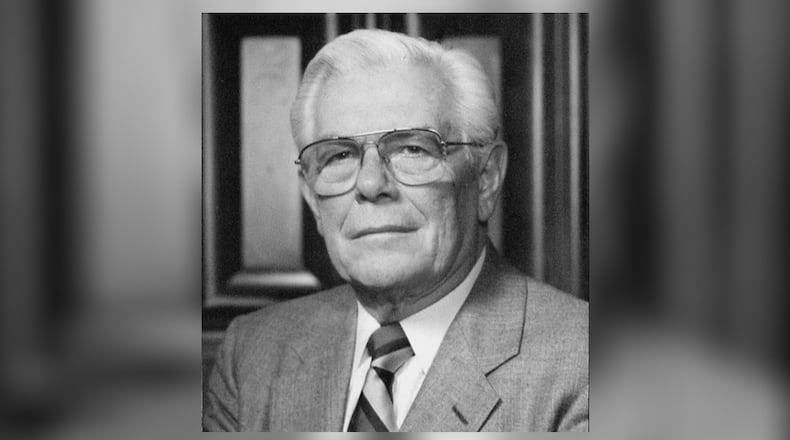Fraze was born in 1913 on a farm near Muncie, Indiana and sold newspapers as a child. After moving to Dayton in 1937, his first job was assembling novelties for Cracker Jack boxes.
In 1950 Fraze opened Dayton Reliable Tool & Manufacturing Co.
Earliest version
Alcoa (Aluminum Co. of America) came to him in 1959 looking for a process for canning citrus juices. He was given a contract to design, engineer and build a prototype machine for that purpose.
“We produced it, but it left plenty to be desired. We came up with a different process, attaching the tab to the end of the can. I built the first tools in the workshop of my home; but with better tooling in the plant, we were able to prove the feasibility of the process,” Fraze once told the Dayton Daily News.
He showed his plans to Alcoa early in 1961. With the help of Fraze’s tools, Alcoa saw that the idea worked and the two sides agreed upon a licensing agreement.
The pop-top
Then came the invention that would change his life. While on a family picnic with friends, he tried to open a can of beer but didn’t have a can opener, so he used a car bumper to open it and thought, “There must be a better way.”
Fraze often told the story of a night he could not sleep, so he got up a 1:30 a.m. and went to his basement workshop to work on ideas about how to attach an opening lever to cans.
“I was only going to work on this thing for an hour and hoped to go back to bed,” he said. “But I was up all night and it came to me — just like that. It was all there. I knew how to do it so it would be commercially feasible.”
Fraze obtained the first patent for a pop-top can in 1963. At the time it was called several things including “ring-pull,” “tab-top,” “zip-top” or “pop-top.”
As with many inventions, it took awhile for it to catch on. Many breweries passed on the invention. Finally, in 1963, Pittsburgh Brewery Co. agreed to test the rings on 300,000 cans of its famed Iron City Beer. The innovation was welcomed by beer-drinkers immediately.
The idea spread from beer cans to the food industry, specifically for citrus, soup and coffee. The “reaction has been terrific, exceeding expectations,” Fraze once said.
The “pop-top” inspired the “panel pullout,” where the complete top of the can is removed in one piece.
In 1977, Fraze modified his invention and patented the ‘push-in and fold back tab” to reduce litter and prevent cuts caused by the previous version.
The first non-detachable pull-top cans were sold by Falls City Brewing Co. in Louisville, Kentucky.
Success
Fraze believed whole heartedly in profit-sharing — including everyone in the plant — and placed great emphasis on training. He insisted on good working conditions for his employees, going so far as to install carpeting in the factory.
Classrooms were built to teach employees the latest production techniques. “The men we want do not exist,” Fraze said. “We need to train them.”
In his 1989 obituary, a quote from one of his many interviews was mentioned:
“They say I am a lucky man. Plenty of money in the bank. A lovely home with several cars. But I don’t consider myself lucky. I believe I succeeded because I was willing to work hard, harder than I ever thought I’d have to. I succeeded because I was determined to succeed.”
Fraze Pavilion
In his memory, his family contributed generously to the Lincoln Park Amphitheater in Kettering, known as the Fraze Pavilion.
The 4,300-seat outdoor amphitheater held its grand opening Sept. 14, 1991 with a sold-out performance by composer and pianist Marvin Hamlisch.
About the Author




